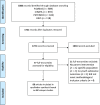Effective Parenting Interventions to Reduce Youth Substance Use: A Systematic Review
- PMID: 27443357
- PMCID: PMC4960727
- DOI: 10.1542/peds.2015-4425
Effective Parenting Interventions to Reduce Youth Substance Use: A Systematic Review
Abstract
Context: Parenting interventions may prevent adolescent substance use; however, questions remain regarding the effectiveness of interventions across substances and delivery qualities contributing to successful intervention outcomes.
Objective: To describe the effectiveness of parent-focused interventions in reducing or preventing adolescent tobacco, alcohol, and illicit substance use and to identify optimal intervention targeted participants, dosage, settings, and delivery methods.
Data sources: PubMed, PsycINFO, ERIC, and CINAHL.
Study selection: Randomized controlled trials reporting adolescent substance use outcomes, focusing on imparting parenting knowledge, skills, practices, or behaviors.
Data extraction: Trained researchers extracted data from each article using a standardized, prepiloted form. Because of study heterogeneity, a qualitative technique known as harvest plots was used to summarize findings.
Results: A total of 42 studies represented by 66 articles met inclusion criteria. Results indicate that parenting interventions are effective at preventing and decreasing adolescent tobacco, alcohol, and illicit substance use over the short and long term. The majority of effective interventions required ≤12 contact hours and were implemented through in-person sessions including parents and youth. Evidence for computer-based delivery was strong only for alcohol use prevention. Few interventions were delivered outside of school or home settings.
Limitations: Overall risk of bias is high.
Conclusions: This review suggests that relatively low-intensity group parenting interventions are effective at reducing or preventing adolescent substance use and that protection may persist for multiple years. There is a need for additional evidence in clinical and other community settings using an expanded set of delivery methods.
Copyright © 2016 by the American Academy of Pediatrics.
Conflict of interest statement
Figures





References
-
- Johnston LD, O’Malley PM, Miech RA, Bachman JG, Schulenberg JE. Monitoring the Future national survey results on drug use: 1975–2014: Overview, key findings on adolescent drug use. Ann Arbor, MI: Institute for Social Research, University of Michigan; 2015
-
- National Research Council and Institute of Medicine Preventing Mental, Emotional, and Behavioral Disorders Among Young People: Progress and Possibilities. Washington, DC: The National Academies Press; 2009 - PubMed
-
- Kumpfer KL, Alvarado R. Family-strengthening approaches for the prevention of youth problem behaviors. Am Psychol. 2003;58(6–7):457–465 - PubMed
-
- Kaminski JW, Valle LA, Filene JH, Boyle CL. A meta-analytic review of components associated with parent training program effectiveness. J Abnorm Child Psychol. 2008;36(4):567–589 - PubMed
-
- Petrie J, Bunn F, Byrne G. Parenting programmes for preventing tobacco, alcohol or drugs misuse in children <18: a systematic review. Health Educ Res. 2007;22(2):177–191 - PubMed
Publication types
MeSH terms
Grants and funding
LinkOut - more resources
Full Text Sources
Other Literature Sources
Medical
Miscellaneous

